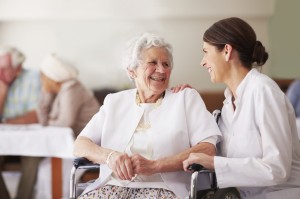 If you or a loved one is staying in a long-term care facility, there are some important things you need to know to prevent infections. According to the CDC, more than 4 million Americans are admitted to or reside in nursing homes and skilled nursing facilities each year, and nearly one million persons reside in assisted living facilities.
If you or a loved one is staying in a long-term care facility, there are some important things you need to know to prevent infections. According to the CDC, more than 4 million Americans are admitted to or reside in nursing homes and skilled nursing facilities each year, and nearly one million persons reside in assisted living facilities.
Why is infection prevention important for long-term care residents?
- When people are living closely together, they are more likely to become sick with infections that are transmitted from person to person.
- Because residents in long-term facilities may have open wounds, devices such as urinary catheters or intravenous catheters, or be incontinent of urine or stool, it is especially important for the staff, visitors, and other patients to practice good infection prevention and control techniques.
- Good infection prevention and control techniques include cleaning hands before and after touching another resident, cleaning and disinfecting environmental surfaces, removing soiled items (like used tissues or adult diapers from the environment), or wearing personal protective equipment (such as gloves, a gown, or a mask).
- Bacteria and viruses that can be transmitted to others in long-term care facilities include methicillin-resistant Staphylococcus aureus (MRSA), Clostridium difficile (C. diff), norovirus, and other bacteria, fungi, or viruses.
- Infections, like influenza or the common cold, can spread when the sick person talks, coughs, or sneezes and releases droplets of saliva and mucus. These droplets can travel through the air and can be inhaled through the nose and mouth of another person or contaminate their hands.
What residents can do:
- Clean your hands before you eat and after using the bathroom. It should take at least 20 seconds to thoroughly wash your hands. Using an alcohol-based hand sanitizer is a good option if your hands are not visibly dirty.
- If you have open sores, cover them with a bandage. Do not pick at your sores or remove your bandage.
- Cover your mouth with the inside of your elbow when you cough or sneeze. Throw away any used tissues and wash your hands afterwards.
- Don’t share your personal items with other residents.
- Remind your care providers to wash their hands frequently. It’s OK to ask if a care provider has cleaned their hands before caring for you.
- If your doctor prescribes an antibiotic for an infection, take the medication exactly how it is prescribed.
- Follow directions if you are asked to stay in your room.
- Don’t touch any food that will be eaten by someone else.
What residents can observe/ask:
- If your healthcare provider has prescribed you antibiotics, be sure to ask the following questions:
- “Do I really need an antibiotic?”
- “Can I get better without this antibiotic?”
- “What side effects or drug interactions can I expect?”
- “What side effects should I report to you?”
- “How do you know what kind of infection I have? I understand that antibiotics won’t work for viral infections.”
- If you have an infection, your caregivers may be wearing protective equipment, like gowns, gloves or face mask. Make sure they take them off before they leave the room.
- Make sure that everyone (residents, care providers, and visitors) wash their hands when they enter the room and when they leave the room.
- Make sure your care provider is wearing gloves if they are removing a dressing. A gown might be necessary if the wound is large.
- Ask staff how they are cleaning items used by many residents (e.g., recreational therapy objects).
What family members or other visitors can do:
- Wash hands before and after each visit.
- Wear a surgical mask if visiting someone that has an infection with germs that can be spread to others through the air (for example, the flu).
- Wear a gown and gloves if visiting someone who has a virus or type of bacteria that can be transmitted through direct contact.
Learn more and share:
- Ask About Your Medication—APIC Infection Prevention and You
- Nursing Homes and Assisted Living (Long-term Care Facilities)—The Centers for Disease Control and Prevention
- Influenza—CDC
